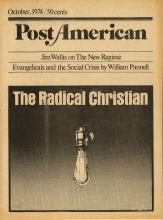Pre-Civil War America was one of the great ages of social reform and experimentation. Many, if not most, of these movements were, at least in part, inspired by Christian faith. Perhaps the most intriguing manifestation of “Christian radicalism” during this period emerged in the early years of Oberlin College. This institution was a product of the revivalism of evangelist Charles G. Finney. Oberlin College merged Finney’s revivalism with a reform program that at times shook the whole nation and made major contributions to abolitionism, feminism, the peace movement, the doctrine of civil disobedience, and other reforms.
It is difficult to know where to start the story of Oberlin. Its prehistory is as important as its history. One place to begin is with Theodore Weld, converted under Finney’s ministry. Weld worked for a while as Finney’s assistant (and while doing so was apparently responsible for pushing Finney in the direction of a controversial “new measure”—that of allowing women to speak in public services) before turning his full attention to reform, adapting “revival” techniques (“protracted meetings,” and the “call for decision”) to this new work. By the early 1830s Weld was focusing on the slavery issue and, though little known because he shunned publicity, he became one of the most important abolitionists of the era.
Read the Full Article
You've reached the end of our free magazine preview. For full digital access to Sojourners articles for as little as $3.95, please subscribe now. Your subscription allows us to pay authors fairly for their terrific work!
Already a subscriber?
Login

